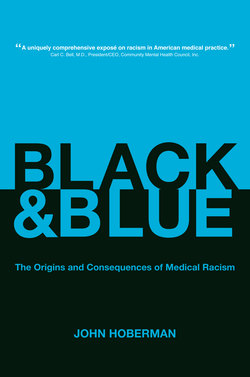Black and Blue

Реклама. ООО «ЛитРес», ИНН: 7719571260.
Оглавление
John Hoberman. Black and Blue
Отрывок из книги
Black and Blue
The Origins and Consequences of Medical Racism
.....
Socially progressive medical liberals also participate in the strategy of denial through an inability or unwillingness to see medical race relations in their historical context. Seeing the Tuskegee scandal as a unique and temporary blemish on the honor of American medicine, they are likely to have little or no idea of how their predecessors judged and treated “the Negro patients” they encountered. Contemplating the possibility that the racial health disparities they found so “disturbing” might be due to “racially discriminatory rationing by physicians and health care institutions,” H. Jack Geiger commented: “We do not yet know enough to make that charge definitively.”91 In fact, Geiger's New England Journal editorial, titled “Race and Health Care—An American Dilemma?” (1996), is the prototype of the medical liberal response to racial health disparities. On the one hand, Geiger confronts the documented disparities and offers none of the conservative alibis that purport to explain them. But he simply cannot bring himself to believe “definitively” that his medical colleagues and the institutions to which they belong are capable of “racially discriminatory” professional behavior. Here, too, we see an important consequence of historical ignorance or naïveté. For either Geiger is unaware of the various forms of medical racism that were rampant in American medicine during the first half of the twentieth century, or he believes that racially motivated conduct on the part of American physicians was somehow abolished by civil rights legislation and the unofficial rules of political correctness that have been widely adopted since that time.
This sort of medical agnosticism has the advantage of incorporating a kind of intellectual modesty into its refusal to judge complex behavior. “We do not presume to know whether bias is truly at work in this setting,” two medical authors state in their 1999 article on “Racial Disparity in Rates of Surgery for Lung Cancer.” “Evidence that bias on the part of physicians (either overt prejudice or subconscious perceptions) influences access to optimal cancer care is disheartening,” they comment, but it is too soon to tell whether even “subconscious perceptions” might be affecting the therapeutic relationship.92 These authors, like Geiger, await “definitive” proof that would “truly” convince them. “Researchers,” the Chronicle of Higher Education reported a year later, “want to investigate further whether minority patients are intimidated by white doctors, or whether doctors use medical terminology that some undereducated people, whatever their race, may have particular difficulty understanding.”93
.....